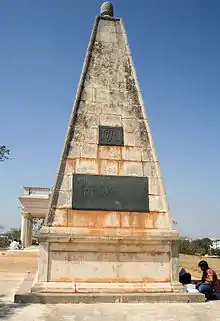Michel Joachim Marie Raymond
General Michel Joachim Marie Raymond (25 September 1755 – 25 March 1798), popularly known as Monsieur Raymond, was a French General in Nizam's military and the founder of Gunfoundry Hyderabad, Hyderabad. He was born in Sérignac, Gascony, France, the son of a merchant.[1]

Early life
In 1775, aged 20, he and his younger brother, William Jean Raymond, left for Pondicherry, India. The idea as he told his father, was to set up a merchant shop. Instead, Michel turned to the more exciting career of being a soldier.
Life

In 1775, Raymond reached Pondicherry to start a merchant shop, later he met and served under French General Bussy, but it was in 1786 that Michel joined the service of the ruling Nizam of Hyderabad. He began as any other soldier, shortly after, he was given 300 soldiers to command.[2]
In 1796, Raymond was appointed Amar-e-Jinsi or Comptroller of Ordnance.[3] He established several cannon and cannonball factories. Under his guidance guns, ammunition and cannons were forged. Gunfoundry or Top ka Sancha near the Fathe Maidan is the best-known of the remaining foundries in India.
When he died in 25 March 1798, only twelve years after enlisting, he had become a military commander of over 14,000 army men. It is also documented that there may have been a female battalion of soldiers. The cause of Michel Raymond's death is a mystery, the two suggested causes are poisoning or suicide.[2]
Respect
Raymond became a close friend of the Nizam Ali Khan, Asaf Jah II. Raymond was not only held in high esteem by the Nizam, but had also won the love and trust of the local people. He made himself popular through his kindness, bravery and contribution to Hyderabad. To the Muslims, he was Musa Rahim, and to the Hindus, he was Musa Ram.[4] George Bruce Malleson said that
- "No European of mark who followed him in India, ever succeeded in gaining to such an extent the love, the esteem, the admiration of the natives of the country."
Raymond's Tomb

Michel Raymond's tomb is a black granite tombstone, conical in shape, about 7 metres high and it has the initials JR on it. The ill-maintained pavilion was built by the Nizam and collapsed in October 2001 in heavy rain. The 200-year-old tomb had a face lift, including a brand new pavilion. Opened 14 April 2003 this cost an estimated 500,000 INR.
The tomb is located near Asmangadh fort on top of a hillock at Mussa Ram Bagh, Malakpet, about 3 km from the Oliphant Bridge (currently known as Chaderghat Bridge), in East Hyderabad. Until about 1940, people would visit his tomb on the anniversary of his death, taking incense and other offerings to him. His grave had become like a shrine. He is also remembered in Hyderabad, with the area called Mussa Ram Bagh (Monsieur Raymond).
Citations
- Lalanne, Ludovic (1877). Dictionnaire historique de la France (in French). p. 1530. Retrieved 9 March 2018.
- "Raymond's tomb languishes in neglect". The Hindu. 30 May 2012. Retrieved 30 May 2012.
- "Raymond's tomb to get amphitheatre - Times Of India". Articles.timesofindia.indiatimes.com. 13 March 2004. Retrieved 14 March 2012.
- Dalrymple 2004, p. xxxiv
References
- Dalrymple, William (2004). White Mughals: love and betrayal in eighteenth-century India. Penguin Books. ISBN 978-0-14-200412-8.CS1 maint: ref=harv (link).
- White Mughals - William Dalrymple (2002)
- History of the French in India - George Bruce Malleson (18??)